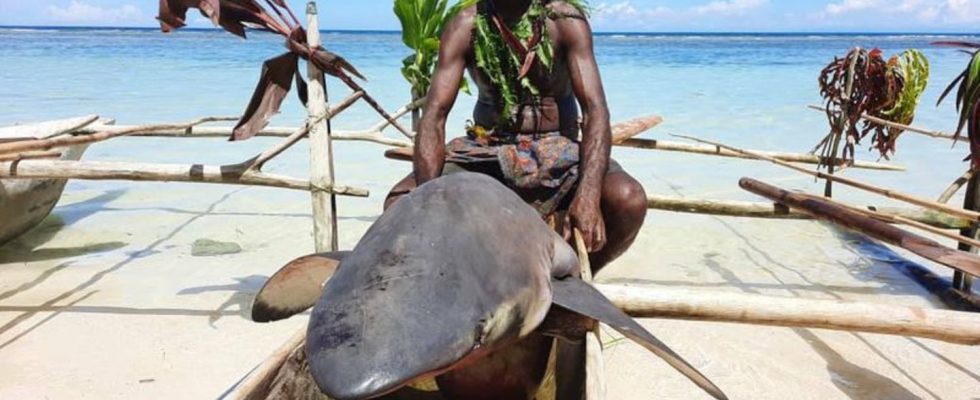Company
Papua New Guinea: Attracting sharks with ancient songs
A man sits on a dead shark at the Shark Calling Festival. photo
© Christina Steiner/Godfree Abage/Shark Calling Festival/dpa
A mesmerizing festival: on an island off Papua New Guinea, locals call out dangerous sharks with songs and rattles. The animals swim up as if hypnotized – and are then killed by hand.
The men go out to sea in rickety wooden boats to charm sharks. The night before they sang ancient spiritual songs in honor of the fascinating predatory fish, fasted and prepared. The town of Kono in has been celebrating since Sunday Papua New Guinea hosts its world’s only Shark Calling Festival. For three days everything revolves around the art of seducing sharks. Only here, on the west coast of the island of New Ireland, are the animals lured near the canoes by singing and special rattles – and then caught with their bare hands.
“The “shark callers” alone know how they do it, there are many secret things involved,” said John Merebo, organizer of the event, the German Press Agency. This fishing tradition has been around forever, since humans first settled in this part of the world, he says. “The festival has actually always existed, but at some point it became known beyond the country’s borders.” That was around 1975.
“Sharks are extremely important in our culture,” says Merebo. “Nobody else calls them, only we do.” The tradition, which is prevalent in the villages of Kono, Messi and Kontu, is passed down from generation to generation, from father to son. But the Hiruf is not a group event: Everyone paddles out alone on the Bismarck Sea – a small marginal sea in the Pacific Ocean. Some with elaborate headdresses and the body brightly painted. People are convinced: the spirits of the ancestors live in the sharks, which will protect them from all dangers if they strictly follow the rules.
Sharks swim into the arms of fishermen
A few kilometers from shore, the men finally begin to sing and bang underwater with rattles made of coconuts (“larung”). Some say the sharks are mesmerized by the special sound and propelled straight into the arms of the fishermen. It is more likely, however, that sharks confuse the sounds – which are carried far in the water – with those of schools of fish.
When the shark circles near the boat, the fisherman catches it with a kind of lasso from which it can no longer free itself. Then he kills the animal with a wooden stick. In the village, anyone who returns with a shark is celebrated like a hero. “This time 35 shark callers are taking part in the expedition,” says Merebo. “On average, about ten sharks are caught during the festival, but once, in the 1960s, it was as high as 20.” You never know how successful the shark callers will be: “It depends on whether they have followed all the rules and fasted beforehand,” emphasizes Merebo.
In most cases, these are not harmless reef sharks, but those “that come from the depths of the ocean,” says the organizer. Bull sharks, for example, and often lemon sharks as well. The people of New Ireland had “a remarkable connection with these majestic creatures,” news site Loop PNG wrote ahead of the festival’s start. Since 2021, the tradition has been a national event in Papua New Guinea, a country of nine million people north of Australia.
Concerns about deep-sea mining projects
And then what happens to the predatory fish? “Sharks are a delicacy here in the village,” says Merebo. “Nothing goes to waste, we eat everything from head to tail except the skin.”
But the people of Kono worry about the future. On the one hand because of climate change, because rising sea temperatures have consequences for all ocean dwellers. On the other hand, there are controversial deep-sea mining projects in the region.
A few years ago, the Canadian-Australian company Nautilus tried to exploit a metal ore deposit in the Bismarck Sea that contains significant amounts of copper, zinc, silver and gold. There was resistance to this on many islands in the region. The project initially failed in 2019. Some Pacific countries have since called for all such plans to be halted.
“Deep-sea mining could drastically reduce the shark population in our region,” Merebo is convinced. “The locals simply don’t have the capacity to fend off the foreigners who want to mine and come with huge fishing nets.” The Shark Calling Festival therefore also wants to contribute to the protection of all marine life in the region and to educate people internationally about the dangers.

